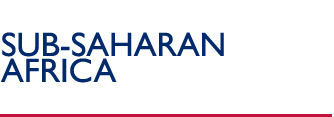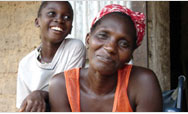 |
African Global Competitiveness Initiative (AGCI)
Appropriate trade policies offer opportunities for African countries to build free markets and increase foreign investments that promote economic growth, create jobs, and raise living standards. U.S. Government assistance in helping African governments implement good policies has supported African efforts to reduce poverty through sustained, private sector-led economic growth.
The African Global Competitiveness Initiative (AGCI) is a $200 million, five-year Presidential Initiative aimed at promoting the export competitiveness of enterprises in sub-Saharan Africa (SSA) in order to expand African trade with the United States, other international trading partners and regionally within SSA. AGCI builds on the African Growth and Opportunity Act (AGOA) and works with other donor initiatives, including the World Bank's Making Finance Work for Africa and the multilateral Infrastructure Consortium for Africa.
Objectives
AGCI's overall objective is to promote export competitiveness of enterprises in SSA. To achieve this objective, AGCI has two main strategies, to: 1) provide technical assistance that advances export competitiveness; and 2) support complementary activities that contribute to the objectives of AGCI. AGCI seeks to leverage its resources with those of other USAID-funded programs and programs financed by other international financial institutions as well as with investment resources from the private sector; AGCI strives to achieve a greater development impact through a multiplier effect.
Launched in 2006, AGCI supports efforts that:
- improve the business and regulatory environment for private sector-led trade and investment,
- strengthen the knowledge and skills of SSA private sector enterprises to take advantage of market opportunities,
- increase access to financial services for trade and investment, and
- facilitate investments in infrastructure.
AGCI Implementation and Value Added
The AGCI program is implemented through a series of projects that are SSA-wide, regional, or national in scope. Projects can be linked to each other, to other donors, or to private sector investments. The ultimate goal of AGCI is to support African policymakers in advancing trade-led economic growth, complementing existing projects with additional resources. Through the addition of the Knowledge Sharing and Analysis (KSA) project, AGCI intends to add value to its field-based technical assistance programs by improving AGCI stakeholder knowledge sharing practices, system, and tools, enhancing USAID ability to frame, disseminate, and prioritize program and best practice information, serve as a knowledge sharing and best practice resource for AGCI stakeholders, and increase USAID's credibility as a source of best practices in trade-led economic growth.
| AGCI illustrative budget
| FY 2006 |
FY 2007 |
FY 2008 |
FY 2009 |
FY 2010 |
| $30 million | $35 million |
$40 million | $45 million | $50 million |
USAID Washington, Regional Missions, Bilateral Missions, and/or other U.S. Government (USG) Agencies can implement activities using AGCI funding, and may also contribute to the AGCI objectives using other sources of funding. AGCI is being implemented using the following activities:
- African Global Competitiveness Hubs: The four regional Global Competitiveness Hubs are the primary implementers of AGCI and are located in Ghana and Senegal for West Africa, Botswana for Southern Africa and Kenya for East and Central Africa and are managed by the respective USAID Regional Missions. The Competitiveness Hubs, also known as Trade Hubs, are the regional focal points for AGCI. They provide information and technical assistance to African organizations, U.S. Government agencies, donor and civil society organizations, and the private sector on trade, investment, and business activities in the region, including training opportunities.
- Knowledge Sharing and Analysis (KSA): The KSA project supports AGCI by identifying and disseminating trade-led economic growth best practices among African institutions, governments and enterprises, Global Competitiveness Hubs, and other AGCI stakeholders including through knowledge sharing and analysis briefs (KSABs), summaries of applied best practices, conferences, trainings, and presentations. In addition, the KSA project is tasked with evaluating and improving USAID knowledge sharing strategy, practices, and tools, including AGCI's performance monitoring system. The KSA project is developing a Knowledge Sharing Strategy for the Africa Bureau and will consolidate USAID's reporting for AGCI and assist in the preparation of the annual AGOA Forum to be held in Washington, D.C. in 2008. The project will also prepare Annual Performance Reports on AGCI.
- African Growth and Opportunity Act (AGOA) Forum Workshops: Outside the annual AGOA Forums, AGCI supports workshops held to build on AGOA and concentrate trade capacity building activities on specific sectors or regions.
- Co-Financing Trade Capacity Building Projects: AGCI funds are also used as a resource to finance and/or co-finance other USAID projects, and activities implemented by other USG agencies that contribute to the objectives of AGCI.
USAID Roles
USAID's Africa Bureau, Office of Sustainable Development (AFR/SD) provides general oversight of the implementation of AGCI programs. This includes budget and strategic planning, monitoring and tracking results, accountability, interagency coordination, and management of selected contracts, grants and interagency agreements to implement AGCI. AFR/SD is also responsible for SSA-wide consolidated reporting on the activities and results for AGCI using USAID's existing performance monitoring, and other credible third-party sources (e.g., World Bank, Heritage Foundation). USAID's Economic Growth, Agriculture, and Trade (EGAT) Bureau contributes subject matter experts in the finance and infrastructure components of AGCI to provide technical leadership under AFR/SD's direction.
The USAID Regional Missions manage regional activities, address trans-border issues, and some selected multi-country activities that cannot be managed bilaterally, particularly in non-USAID presence countries. These regional AGCI programs are implemented through the network of four African Global Competitiveness Hubs under USAID Regional Mission Management and, when appropriate, with African regional organizations.
USAID Bilateral Missions and U.S. Embassies are partners in the implementation of national level AGCI projects. A portion of Bilateral USAID Missions' budgets set aside for economic growth include AGCI funds. Additional centrally managed AGCI funds can be transferred to the field and/or programmed from Washington D.C. in support of any of AGCI's components.
Key Partners
AGCI is actively working with African regional economic organizations, national governments, and the private sector to remove trade and investment barriers and encourage public-private partnerships. Illustrative partners include: SSA organizations responsible for trade and investment promotion; regional organizations such as the ECOWAS, COMESA, and SADC; the African Partnership Forum; the private sector represented by business associations; and other U.S. Government partners. In addition, AGCI is actively seeking collaboration and coordination with other donors as well as international and regional financial institutions, commercial banks, private investors, and stock exchanges in global capital markets.
AGCI Knowledge Sharing and Analysis Briefs (KSABs) downloads
- Proceedings of the 1st African Global Competitiveness Hub Meeting, Ghana, March 3-5, 2008 (PDF, 1,100kb)
- AGCI program description (PDF, 115kb)
- KSA program summary (PDF, 101kb)
- African Growth and Opportunity Act (AGOA) Country Contacts List (PDF, 190kb)
- Country Membership in Regional Economic Organizations by
Regional Grouping (PDF, 177kb) and by
Country (PDF, 217kb)
- Improving the Policy, Regulatory, and Enforcement Environment for Private Sector-Led Trade and Investment (pdf, 142kb)
- Improving the Market Knowledge, Skills, and Abilities of Private Sector Enterprises to Trade (pdf, 135kb)
- Increase Access to Financial Services for Trade and Investment (pdf, 150kb)
- Upcoming African Trade Events
- Africa's Growth and Competitiveness in 2007 [pdf,873kb]
French [pdf,866kb]
Portuguese [pdf,791kb]
- USAID Assistance to Africa:
Strengthening Africa’s Trade under AGOA [pdf,873kb]
USAID African Global Competitiveness Hub Web site links
Back to Top ^
|


